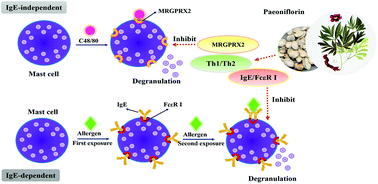Inhibitory effect of paeoniflorin on IgE-dependent and IgE-independent mast cell degranulation in vitro and vivo
Abstract
The incidence of allergic diseases has increased to such a point that they have become common and have reached epidemic levels. However, their pathogenesis is not fully understood. Paeoniae Radix Rubra is a traditional Chinese medicine that is also used as a dietary supplement. Its main active ingredient is paeoniflorin. Paeoniflorin has good anti-inflammatory, immunomodulation, and antitumor effects. It is utilized in the treatment of various diseases in clinical settings. However, its effects on type I allergies and pseudoallergic reactions have not been comprehensively studied. In this study, we aimed to use DNP-IgE/DNP-BSA and C48/80 to simulate type I allergies and pseudoallergic reactions to evaluate the therapeutic effects of paeoniflorin to these diseases and identify its molecular mechanisms in cell degranulation both in vivo and in vitro. Results showed that paeoniflorin inhibited the degranulation of RBL-2H3 cells induced by these two stimuli (IgE-dependent and IgE-independent stimuli) in a dose-dependent manner. Moreover, qPCR and western blot analyses indicated that paeoniflorin may regulate the IgE/FcεR I, MRGPRB3, and downstream signal transduction pathways to exert its therapeutic effects on type I allergies and pseudoallergic reactions. In addition, DNP-IgE/DNP-BSA and compound 48/80 were used to induce the establishment of a passive cutaneous anaphylaxis mouse model. Paeoniflorin was found to suppress the extravasation of Evans Blue and tissue edema in the ears, back skin, and paws of the mice. This result further confirmed that paeoniflorin has a notable therapeutic effect on type I allergies and pseudoallergic reactions. Therefore, paeoniflorin could potentially be used as a drug for the treatment of type I allergies and pseudoallergic reactions. This study provides new insights into expanding the treatment range of paeoniflorin and its pharmacological mechanism.



 Please wait while we load your content...
Please wait while we load your content...